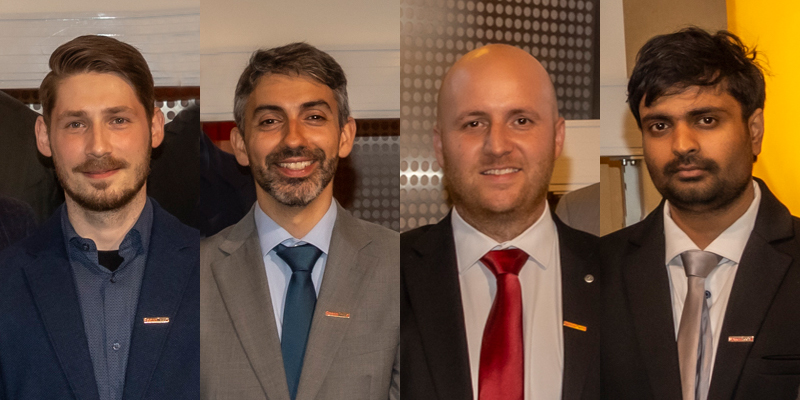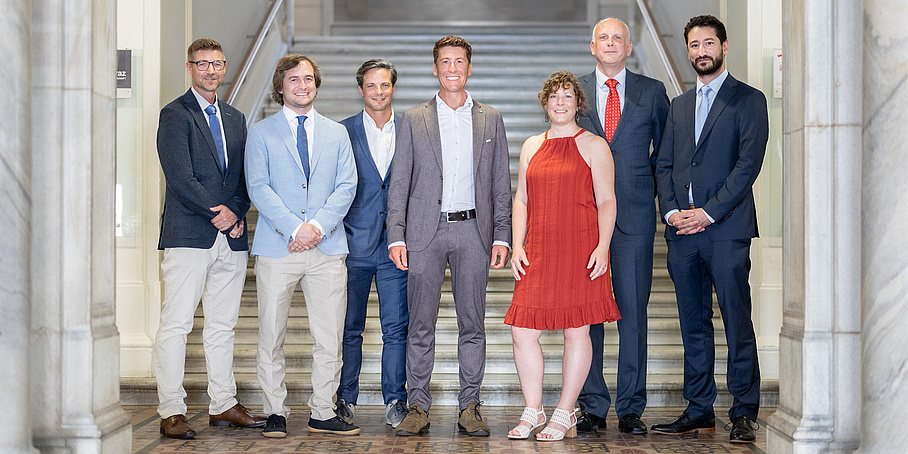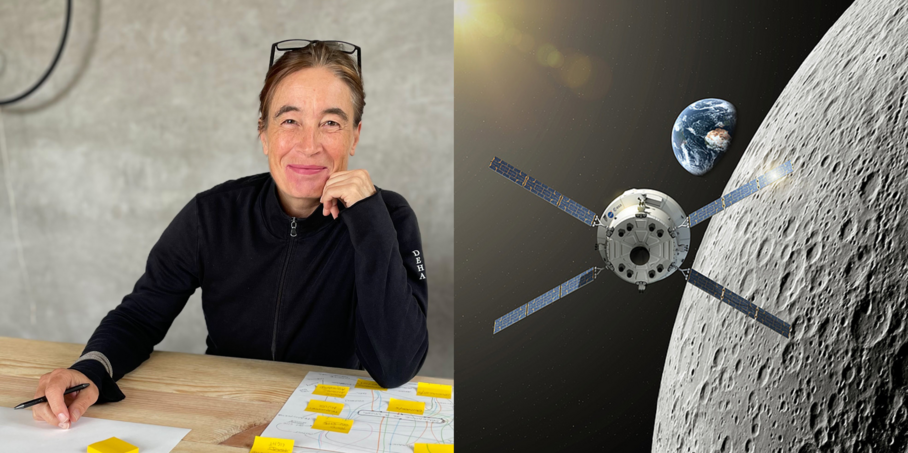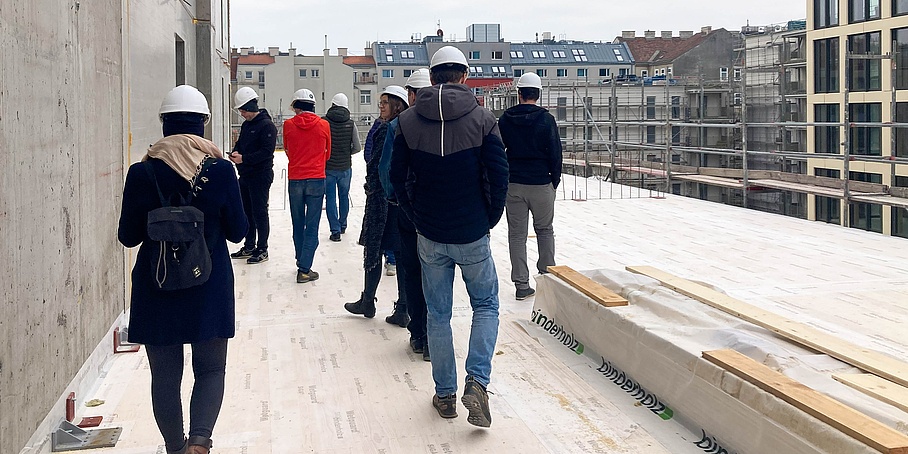July
Certificate Ceremony: Expertise for Major Road Infrastructure
As part of the continuing education programme “Drive the Expert”, which was developed on behalf of ASFINAG through a collaboration between Life Long Learning, the Institute of Highway Engineering and Transport Planning, and the Austrian Research Association for Roads, Railways and Transport (FSV), ASFINAG employees were able to expand their fundamental knowledge in a specific field and acquire in-depth expertise in the construction and operation of roads, tunnels and bridges.
In his ceremonial speech, Stefan Vorbach, Vice Rector for Academic Affairs, praised the commitment of the graduates and emphasised the programme’s practical orientation, which meets the highest standards and conveys knowledge that can be applied directly.
“I warmly congratulate you on your graduation and wish you much success, curiosity and enthusiasm on your further journey – the kind of enthusiasm it takes to make our world a little better through knowledge, technology and passion.”
The LLL team joins in the congratulations!

Theia Labs – A SpaceTech Success Story
Sometimes a big idea doesn’t begin in a laboratory, but in a seminar room. Their goal: to supply small satellites (CubeSats) in low Earth orbit (LEO) with energy more efficiently through laser-based wireless power transmission. Supported by ESA BIC Austria, the SpaceTech experts are now developing their first prototype. Their technology extends satellite lifespans, reduces the need for batteries, and creates room for additional payload.
Beyond space applications, they also see potential on Earth – for instance, in precision agriculture, which enables more environmentally friendly and sustainable farming. This includes laser-based weed control, which eliminates the need for pesticides. Theia Labs is therefore pursuing a dual-market strategy: space and agriculture.
The SpaceTech alumni achieved their first major milestone by securing their initial funding.
Congratulations!

June
Introducing: Barbara Imhof – Lecturer in the SpaceTech Master’s Programme
She is a space architect, design researcher, and considered a pioneer in Europe. In the module “Human Spaceflight”, she demonstrates what architecture must be capable of in outer space.
Extreme temperatures, no breathable air, and confined spaces – space architecture always deals with the harshest conditions. This makes it all the more challenging to create habitats where humans can not only survive but also feel comfortable. After all, a journey or stay in space, on the Moon, or even on Mars is far from a day trip.
After studying architecture, Barbara Imhof completed a Master of Space Studies and undertook an internship at NASA. Twenty years ago, together with René Waclavicek and Waltraut Hoheneder, she founded LIQUIFER, a space architecture firm that collaborates with major European aerospace companies on the development of international space stations.
What she particularly values about her work: “I work with highly professional people from a wide range of backgrounds and disciplines who share my enthusiasm for space exploration. It gives me a great sense of purpose to be part of something new, future-oriented and significant.”

Don't Miss Out: University Courses Starting August – September 2025
- Mathematics for Pension Insurance:
Start 29 August, application by 28 July - Mindful Leadership:
Start 2 September, application by 15 August - Green Microelectronics:
Start 8 September, application by 29 August - Decarbonisation & Sustainability Management:
Start 8 September, application by 1 September - Management of Corporate Processes and Cultures:
Start 12 September, application by 25 August - Energy & Green Production 1:
Start 8 September, application by 3 September - Zero Carbon Management:
Start 8 September, application by 3 September - Sensory Evaluation of Food: Introduction:
Start 16 September - Open Educational Resources:
Start 26 September, application by 25 August
May

Subsidised Executive MBA with a Specialisation in Green Microelectronics
The microelectronics industry of tomorrow is set to become more European and more sustainable. The Executive MBA programme Digital Leadership – Green Microelectronics equips future leaders with the necessary tools, combining academic expertise with hands-on leadership skills. In addition to modules on digital transformation and leadership development, the 2026 intake will place a special focus on the production of recyclable and energy-efficient semiconductors made from environmentally friendly materials.
- Subsidy: For groups of at least 10 participants, the regular fee of €24,900 (VAT-exempt) is reduced to €6,500 (VAT-exempt). As places are limited, early application is strongly recommended!
- Upcoming online information sessions:
- 22 May 2025, 16:00 – 17:00; registration
- 16 June 2025, 16:00 – 17:00; registration
- 16 July 2025, 16:00 – 17:00; registration
- Further information about the Executive MBA
Sustainable Construction Methods and Smart Systems – On-Site Insights
Two days full of timber, technology, and fascinating insights:
The tour began at MHS Installation Systems in Stainz – a pioneer in drinking water supply and a leader in ready-to-install system boxes. After an inspiring factory tour, the group visited the newly renovated Stainzer Warte – 93 wooden steps, stunning panoramic views, and a short break. At Kaufmann Bausysteme in Kalwang, the high level of prefabrication, advanced planning and production processes, and modular timber architecture were truly impressive. In Leoben, Mayr-Melnhof Holz provided a clear insight into the capabilities of modern timber processing.
In Vienna, the focus shifted to large-scale projects: “Village im Dritten” and the expansive LeopoldQuartier – both featuring highly interesting combinations of timber construction systems.
Conclusion: Much seen, much learned – a successful excursion!
Well done on earning your MBA!
“After finishing my Computer Science degree, I started getting more interested in topics like management and leadership. My technical background didn’t cover much in that area, so I saw the Master's as a great way to fill that gap. I chose the Future Mobility & Management specialisation because, as a software developer, I work on innovative automotive software projects.
Looking back, the MBA was a fantastic experience – both professionally and personally. The lecturers were brilliant: knowledgeable, hands-on, and always up to date.”
Helmut Aschbacher from Programme Management personally handed over the final completion notice and congratulated Toni on behalf of the whole LLL team.
![[Translate to Englisch:] [Translate to Englisch:]](https://www.tugraz.at/fileadmin/_processed_/6/f/csm_Zertifikatsverleihung-DEX-2025-by-Nikola-Milatovic_2m_0d4f18ab1c.jpg)





